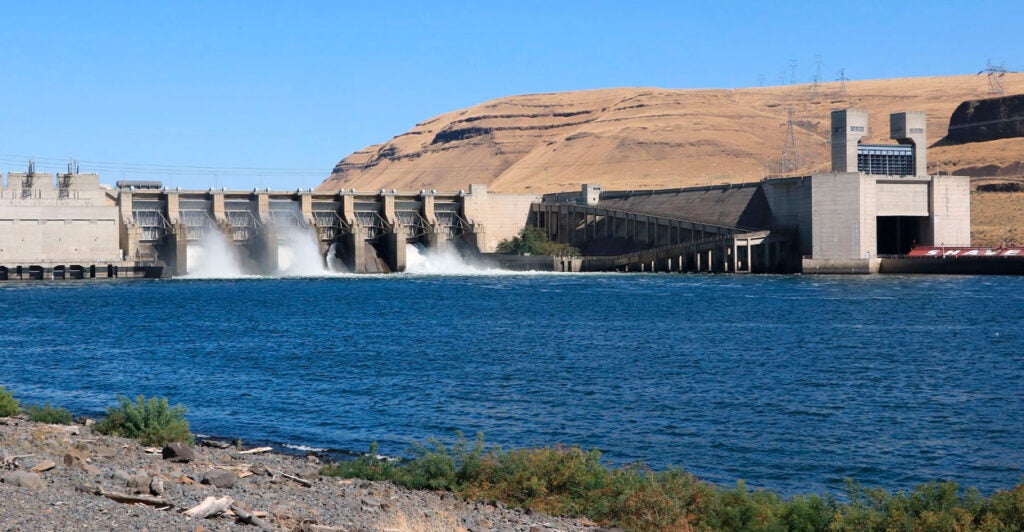Instead of using fossil fuels, we’re told to use “clean” energy: wind, solar, or hydropower.
Hydro is the most reliable. Unlike wind and sunlight, it flows steadily.
But now, environmental groups want to destroy dams that create hydropower.
“Breach those dams,” an activist shouts in my new video. “Now is the time, our fish are on the line!”
The activists have targeted four dams on the Snake River in Washington state. They claim the dams are driving salmon to extinction.
It’s true that dams once killed lots of salmon. Pregnant fish need to swim upriver to have babies, and their babies swim downriver to the ocean.
Suddenly, dams were in the way.
Salmon population dropped sharply.
But that was in the 1970s.
Today, most salmon make it past the dam without trouble.
How?
Fish-protecting innovations like fish ladders and spillways guide most of the salmon away from the turbines that generate electricity.
“Between 96% and 98% of the salmon successfully pass each dam,” says Todd Myers, environmental director at the Washington Policy Center.
Even federal scientific agencies now say we can leave dams alone and fish will be fine.
But environmental groups don’t raise money by acknowledging good news.
“Snake River Salmon Are in Crisis,” reads a headline from Earthjustice.
Gullible media fall for it.
The Snake River is the “most endangered in the country!” claimed the evening news anchor.
“That’s simply not true,” Myers explains. “All you have to do is look at the actual population numbers to know that that’s absurd.”
Utterly absurd. In recent years, salmon populations are higher than they were in the 1980s and ’90s.
“They make these claims,” Myers says, “because they know people will believe them … they don’t want to believe that their favorite environmental group is dishonest.”
But many are.
In 1999, environmental groups bought an ad in The New York Times saying “salmon … will be extinct by 2017.”
“Did the environmentalists apologize?” I ask Meyers.
“No,” he says. “They repeat almost the exact same arguments today, they just changed the dates.
I invited 10 activist groups that want to destroy dams to come to my studio and defend their claims about salmon extinction. Not one agreed.
I understand why. They’ve already convinced the public and gullible politicians.
Idaho Republican Rep. Mike Simpson says, “There is no viable path that can allow us to keep the dams in place.”
“We keep doing dumb things,” says Myers. “We put money into places where it doesn’t have an environmental impact, and then we wonder 10, 20, 30 years [later] why we haven’t made any environmental progress.”
Politicians and activists want to tear down Snake River dams even though they generate tons of electricity.
“Almost the same amount as all of the wind and solar turbines in Washington state,” says Myers. “Imagine if I told the environmental community we need to tear down every wind turbine and every solar panel. They would lose their minds. But that’s essentially what they’re advocating by tearing down Snake River dams.”
I push back: “They say, ‘Just build more wind turbines.'”
“The problem is, several times a year, there’s no wind,” he replies. “You could build 10 times as many wind turbines, but if there’s no wind, there’s no electricity.”
Hydro, on the other hand, “can turn on and off whenever it’s needed. Destroying hydro and replacing it with wind makes absolutely no sense. It will do serious damage to our electrical grid.”
“It’s not their money,” I point out.
“Exactly,” he says. “If you want to spend $35 billion on salmon, there’s lots of things we can do that would have a real impact.”
Like what?
“[Reduce the population of] seals and sea lions,” he says. “The Washington Academy of Sciences says that unless we reduce the populations, we will not recover salmon.”
“People used to hunt sea lions,” I note.
“Yeah, that’s why the populations are higher today.”
But environmentalists don’t want people to hunt sea lions or seals. Instead, they push for destruction of dams.
“Because it’s sexy and dramatic, it sells,” says Myers. “It’s more about feeling good than environmental results.”
COPYRIGHT 2024 BY JFS PRODUCTIONS INC.
We publish a variety of perspectives. Nothing written here is to be construed as representing the views of The Daily Signal.
